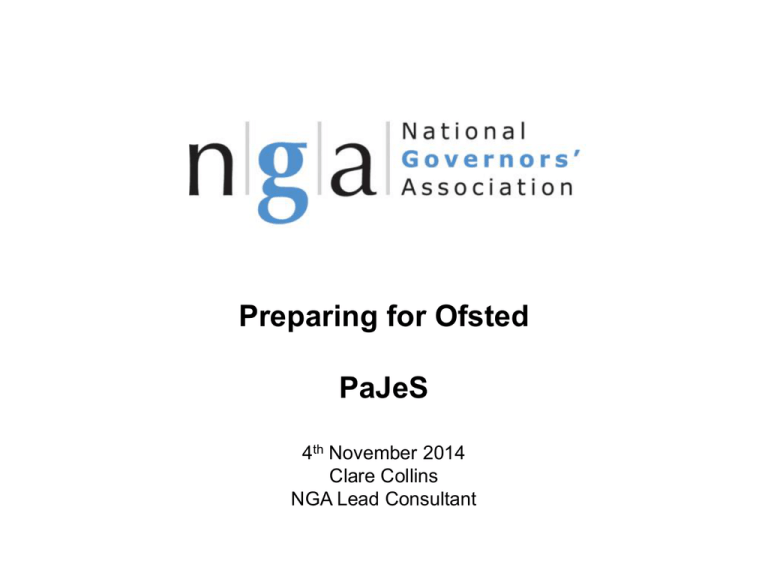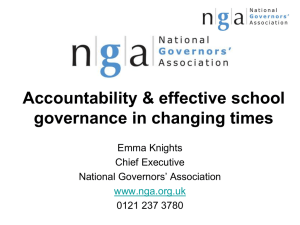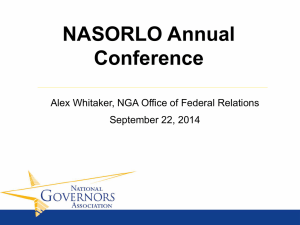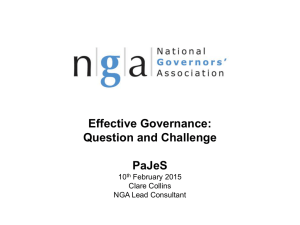presentation
advertisement

Preparing for Ofsted PaJeS 4th November 2014 Clare Collins NGA Lead Consultant © NGA 2013 www.nga.org.uk 1 Welcome and introductions © NGA 2013 www.nga.org.uk 2 NGA is a membership organisation • Representing the governors and trustees in all state funded schools in England • Our aim to improve the effectiveness of governing boards by providing expert and tailored information and advice, and challenge when appropriate Standard governing body membership is £75 GOLD governing body membership is £260 and includes an advice line © NGA 2013 www.nga.org.uk 3 Purpose of the session At the end of the session governors should have an understanding of: – What Ofsted expect from the governing body – What ‘knowing your school’ means – The criteria against which the governing body will be judged – What to expect from the Ofsted visit © NGA 2013 www.nga.org.uk 4 ‘without strong and effective governance, our schools simply won’t be as good as they can be’ HMCI © NGA 2013 www.nga.org.uk 5 HMCI and the Ofsted framework • Since September 2012, Sir Michael Wilshaw, HMCI, has changed – and continues to fine tune - the Ofsted framework • There is more emphasis on governance in Ofsted inspections – Expectations of governance are greater but reasonable – External reviews are being recommended for schools where governance is seen to be in need of strengthening – All governors are expected to be familiar with their school’s Ofsted data dashboard – All governors need to know their school’s strengths and weaknesses • We do need to do improve governance © NGA 2013 www.nga.org.uk 6 Since September 2012, Ofsted has significantly increased the focus on school governance Proportion of all inspected schools receiving recommendations regarding governance Sept-Nov 12 Yes Sept-Dec 11 No Sept 10-July 11 0% © NGA 2013 20% 40% 60% www.nga.org.uk 80% 100% 7 Quality governance In all types of schools, high quality governance is characterised by a relentless focus on the three core strategic functions: a. b. c. Setting vision, ethos and strategic direction Holding headteachers to account for teaching, achievement, behaviour and safety, and challenging and strengthening their leadership; Ensuring finances are managed well leading to probity, solvency and effective use of resources From DfE’s Governors’ Handbook, May 2013 In other words … the DfE want all governing bodies to operate as non-executive boards In order to do this well … governors need to know their school © NGA 2013 www.nga.org.uk 8 In the best schools inspectors found governors were very well informed ‘Regular meetings with the headteacher and presentations from staff inform governors' understanding of the school and its work.’ ‘The governing body seeks the views of parents, carers and pupils and uses the information obtained to inform the school's self-evaluation and the school development plan.’ ‘Governors have a good awareness of the school and a clear view of the strategic direction of the school through regular visits, including to lessons and focus groups.’ ‘Governors carry out their own monitoring of the school’s plans and use this to evaluate how well all aspects are doing. They clearly understand how well pupils are progressing, making it their business to probe the school about any concerns, should they arise.’ ‘Outstanding quality of work undertaken by the governing body could clearly be seen in an audit of the impact on pupils' learning of recent disruptions caused by inclement weather. As a result of the audit, staff have now agreed a plan to make up any future lost learning time.’ ‘Governors are closely involved in self-evaluation procedures, ask penetrating questions and expect and receive regular reports and presentations from staff to inform their strategic decision making.’ © NGA 2013 www.nga.org.uk 9 Discussion How do you as governors get to know your school? © NGA 2013 www.nga.org.uk 10 Key sources of information • Prospectus and website • SEF / data dashboard / RAISEonline • Strategy document with school vision / key priorities / KPIs / targets • School development plan • HT report and GB minutes • In year tracking data summary / quality of teaching • External consultant reports • Governor visits © NGA 2013 www.nga.org.uk 11 Visiting the school • Is the purpose of school visits clear? – Getting to know the school – Monitoring improvement priorities • Is there a policy and protocols which have been agreed and shared with staff? • How do governors report on visits? © NGA 2013 www.nga.org.uk 12 Knowing the school Too often governors don’t know what they don’t know … • • • • • • • Is the school self-evaluation fit for purpose and do all governors know the key issues facing the school? Is the headteacher’s termly report to the governing body focused on the strategic plan’s key improvement priorities? How does the governing body use the Ofsted and FFT data dashboards and RAISEonline? Does the governing body receive regular internal in year pupil progress tracking data for all year groups, in an agreed format, and know which groups of children are not progressing well? Do governors know how the Pupil Premium is being spent and the expected outcomes? What does the governing body know about the quality of teaching, staff performance and pay? How do governors know what pupils, staff and parents think about the school? © NGA 2013 www.nga.org.uk 13 Ofsted and governance Ofsted are looking at the effectiveness of governance including how well governors: 1. Carry out their statutory duties, such as safeguarding, and understand the boundaries of their role as governors 2. Ensure that they and the school promote tolerance of and respect for people of all faiths (or those of no faith), cultures and lifestyles; and support and help, through their words, actions and influence within the school and more widely in the community, to prepare children and young people positively for life in modern Britain 3. Ensure clarity of vision, ethos and strategic direction, including long-term planning (for example, succession) 4. Contribute to the school’s self-evaluation and understand its strengths and weaknesses, including the quality of teaching, and reviewing the impact of their own work 5. Understand and take sufficient account of pupil data, particularly their understanding and use of the school data dashboard 6. Assure themselves of the rigour of the assessment process © NGA 2013 www.nga.org.uk 14 7. Are aware of the impact of teaching on learning and progress in different subjects and year groups 8. Provide challenge and hold the headteacher and other senior leaders to account for improving the quality of teaching, pupils’ achievement and pupils’ behaviour and safety, including by using the data dashboard, other progress data, examination outcomes and test results; or whether they hinder school improvement by failing to tackle key concerns or developing their own skills 9. Use the pupil premium and other resources to overcome barriers to learning, including reading, writing and mathematics 10. Ensure solvency and probity and that the financial resources made available to the school are managed effectively 11. Are providing support for an effective headteacher 12. Monitor performance management systems and understand how the school makes decisions about teachers’ salary progression , including the performance management of the headteacher, to improve teaching, leadership and management 13. Engage with key stakeholders 14. Are transparent and accountable, including in terms of recruitment of staff, governance structures, attendance at meetings, and contact with parents and carers. Ofsted School Inspection Handbook, July 2014 © NGA 2013 www.nga.org.uk 15 Exercise Look at the criteria and assess whether your governing body is weak, sound or strong Feedback: One aspect you are confident you are strong in One aspect you may need to review © NGA 2013 www.nga.org.uk 16 Reflection Are there any issues that our governing body needs to address prior to our Ofsted visit? © NGA 2013 www.nga.org.uk 17 The Ofsted interview 1. The timing – usually end of day one or beginning of day two – make clear what suits you as volunteers 2. Who goes 3. What to take 4. Answering the questions 5. Expressing concerns © NGA 2013 www.nga.org.uk 18 Possible questions 1. What are the strengths and weaknesses in your school? How do you know? 2. What do you know about the quality of teaching? Do you observe lessons? 3. What is your school doing to narrow the gap? What does pupil premium amount to? What is the expected impact of interventions this year? 4. Progress in English in key stage three is poor … what is the school doing about this? 5. Is your curriculum broad and balanced and so preparing the children for life in modern Britain? 6. How do governors monitor staff performance and make decisions on pay advancement? 7. Are parents happy with the school? How do you know? © NGA 2013 www.nga.org.uk 19 The Ofsted report • The feedback meeting – What time / who goes / what to do and say / confidentiality • The draft report – 24 hours to comment: chair must have sight of the draft and the opportunity to comment (check accuracy of language used) • Publication – Usually within three weeks • Evaluation and appeals – Check details © NGA 2013 www.nga.org.uk 20 Next steps Key issues … © NGA 2013 • To be dealt with by whom? • How? • When? www.nga.org.uk 21 Reviewing the session We have covered: – What Ofsted expect from the governing body – What knowing your school means – The criteria against which the governors body will be judged – What to expect from the Ofsted visit Any questions? © NGA 2013 www.nga.org.uk 22 Reviewing your governing board’s effectiveness • Schools are expected to self evaluate and this should include governance • Knowing your strengths and weaknesses is the starting point for identifying where to begin with developing the governing body • The discipline of a review / development / review cycle leads to incremental improvement Consider: When did you last review your GB’s effectiveness? Are there any barriers to carrying out a review? What are the options for a review? Materials such as the APPG 20 Questions and the NGA evaluation framework based on these, Governormark, GSET © NGA 2013 www.nga.org.uk 23 www.nga.org.uk governorhq@nga.org.uk 0121 237 3780 © NGA 2013 www.nga.org.uk 24





